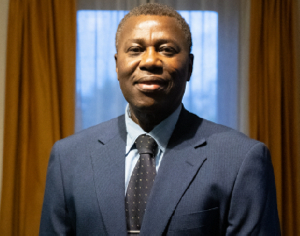Remittances to Ghana from non resident Ghanaians over the years have increased tremendously. According to figures released by the Bank of Ghana, private inward transfers from NGOs, religious groups, individuals etc through the banks and financial companies for January-November 2005 amounted to $4.25bn, making it the largest source of foreign exchange. This figure could still be high since some remittances do not pass through banks and other financial institution.
This represents a 60.1 percent increase over the corresponding period in 2004, which was in turn a 36.7 percent increase over the same period in 2003. Most significantly, last year’s private remittances represent more than 40 percent of Ghana’s gross domestic product last year, estimated to be around $10.6 billion.
This is a sign of non-resident Ghanaian’s confidence in the country in terms of good governance and the rule of law. The government of the day deserves a pat on the back.
The rising trend in remittances has caused the government to be complacent and somehow neglecting some other productive parts of economy. Admittedly, members of the ruling government pride themselves with this success. It appears Ghana is gaining from brain drain as far as the issue of remittances is concerned. Papa Owusu Ankomah, the former Minister of Interior in his address at the 39th Session of the Commission on Population and Development in New York made was quick to acknowledge the benefits Ghana gets through its citizens residing overseas. The amount that we receive through our own people living outside the country, we are told is more than the total aid that we get from donors. Where does this money go? The President, His Excellency John Agyekum Kufour in a press conference organised at the Ghana High Commission in London’s Belgravia Square admitted that the money goes into feeding, building houses and other things. If I would be permitted to continue where the money goes, I would say part of the money is used in organizing expensive funerals. Indirectly he appealed to Ghanaians for what will be like a paradigm shift by channelling monies into businesses and other activities that would create employment and cause our GDP to grow.
It would appear that if we want remittances to go up each year, then we may have to encourage the brain drain. But what are the consequences of this? I think we may have to bow down our head in shame in a sense that we have not been able to keep our educated and best brains here in Ghana for national development. A World Bank report on census and population titled International Migration, Remittances and Brain Drain, says that 47 percent of Ghana's college-educated citizens live abroad. Nearly 90% of all Ghanaian graduates have attempted at one point or the other to travel abroad. These graduates have been trained through the sacrifices of all Ghanaians using our scanty resources to subsidise their training in our polytechnics and universities. Because we are not able to provide ready employment for these, we keep haemorrhaging our professionals to United Kingdom and United States by the day, month by month and year by year. The best brains are leaving for greener pastures. For a country with about half of its graduates missing, one has to worry but indirectly, our politicians appear to be happy about the brain phenomenon in Ghana – because “remittances are growing”.
I think we will be getting it wrong if we think this way. In Europe and in America, our graduates, who could have used their human resources back home, find themselves doing ‘donkey’ jobs like cleaning, as labourers in construction sites and taxi drivers. I am not saying this to denigrate these brothers and sisters or the jobs they do. My source of worry is what looks like double standards in that none of these people will do the same kinds of jobs back home even if the same remuneration was offered. I recently asked a friend in London if he would do the same job he does in London back home even if it was for the same wages. His answer was No.
At the dawn of the 21st century, countries’ might and strength does not depend on its natural resources in terms of cocoa, gold, timber and absentee remittances received abroad but rather its human resources - skilled workers. Nigeria with huge earnings from its oil export has its GDP so small. Countries like United Kingdom, Japan, Switzerland, Germany, South Korea etc do not have any natural resources but their economy is buoyant and vibrant. Any questioning mind would ask why? The answer to this is so simple. These countries invested in the human resources of its citizens by giving them quality and employable education. International forces can affect the prices of cocoa, gold, crude oil thus plunging economies into shambles of despair but hardly can events in Lebanon or Iran have influence on the value of our engineers, doctors, accountants, teachers and so on.
Our government must also stop making noise about this influx because the money that comes from outside in most cases do not inject the much needed lifeline into our GDP. Remittances that feed the hungry, that builds magnificent houses and do grand funerals do not move a nation forward. Remittances could be only effective if aimed at investment and improving the lot of the people.
We need to move from the lethargic way of doing things and start to do serious re-thinking. A paradigm shift is necessary if want to succeed. Government should see how we can build a nation with a strong human resource base. This can only be achieved through investment in quality science and technological education. The present state of affairs at our universities is nothing to write home about. We have sacrificed quality on the altar of quantity.
The words of Professor Kwesi Andam, the Vice-Chancellor of the Kwame Nkrumah University of Science and Technology, excellently explain the Ghanaian situation today that “nations are built with brains, not with absentee dollar remittance”. We need absentee dollar remittances but it should not be a substitute for developing a sound human resources base for the country through a carefully drafted strategy but not mere slogans or empty rhetoric.
Appiah Kusi Adomako is an international freelance writer and the president of the Ghana Chapter of Leaders of Tomorrow Foundation. He can be contacted through: Leaders of Tomorrow Foundation, P.O. BOX. KS 13640. Kumasi. Tel www.leaders-of-tomorrow-inc.com

Views expressed by the author(s) do not necessarily reflect those of GhanaHomePage.














